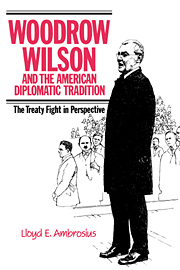Book contents
- Frontmatter
- Contents
- Preface
- Acknowledgments
- List of abbreviations
- 1 Introduction: Wilson's new world
- 2 Origins of Wilson's league of nations idea
- 3 Drafting of the League of Nations Covenant
- 4 American criticism of Wilson's peacemaking
- 5 Revision of the League of Nations Covenant
- 6 The question of control at home and abroad
- 7 The Versailles Treaty in the Senate
- 8 American rejection of the Versailles peace
- 9 The aftermath of Wilson's peacemaking
- 10 Epilogue: Wilson's legacy
- Bibliography
- Index
1 - Introduction: Wilson's new world
Published online by Cambridge University Press: 18 September 2009
- Frontmatter
- Contents
- Preface
- Acknowledgments
- List of abbreviations
- 1 Introduction: Wilson's new world
- 2 Origins of Wilson's league of nations idea
- 3 Drafting of the League of Nations Covenant
- 4 American criticism of Wilson's peacemaking
- 5 Revision of the League of Nations Covenant
- 6 The question of control at home and abroad
- 7 The Versailles Treaty in the Senate
- 8 American rejection of the Versailles peace
- 9 The aftermath of Wilson's peacemaking
- 10 Epilogue: Wilson's legacy
- Bibliography
- Index
Summary
Woodrow Wilson's quest for orderly progress epitomized the modern American search for control. “We have attained,” noted John Dewey, the prominent philosopher and educator, in Quest for Certainty (1929), “at least subconsciously, a certain feeling of confidence; a feeling that control of the main conditions of fortune is, to an appreciable degree, passing into our own hands.” Benefiting from science and technology, Americans had subdued nature. Modern industry and cities had transformed their institutions. As new forms of transportation and communication linked the nation closer together and to the rest of the world, personal relations of traditional rural communities succumbed to bureaucratic patterns. A new corporate or organizational society was reshaping the government's role in both domestic and foreign affairs. Profound social and economic changes prompted Americans to seek what Wilson had called “progressive order” in their democracy. Hoping to manage change so as to avoid uncontrollable chaos or anarchy, progressive Americans preferred reform to revolution. It was in this spirit that Wilson created the League of Nations.
Early in the twentieth century American intellectuals had developed a conscious awareness of what sociologist Edward A. Ross, one of Wilson's former students, described as “social control.” Concentrating on the foundations of order in the United States, Ross examined the various means of society's discipline over individuals. In Social Control (1901) he only hinted at international implications. But in 1917, after the United States entered the World War, the American Sociological Society devoted its annual meeting to this topic. One of its leading members, Charles H. Cooley, expressed a hopeful view of human nature in a paper on “Social Control in International Relations.”
- Type
- Chapter
- Information
- Woodrow Wilson and the American Diplomatic TraditionThe Treaty Fight in Perspective, pp. 1 - 14Publisher: Cambridge University PressPrint publication year: 1987



